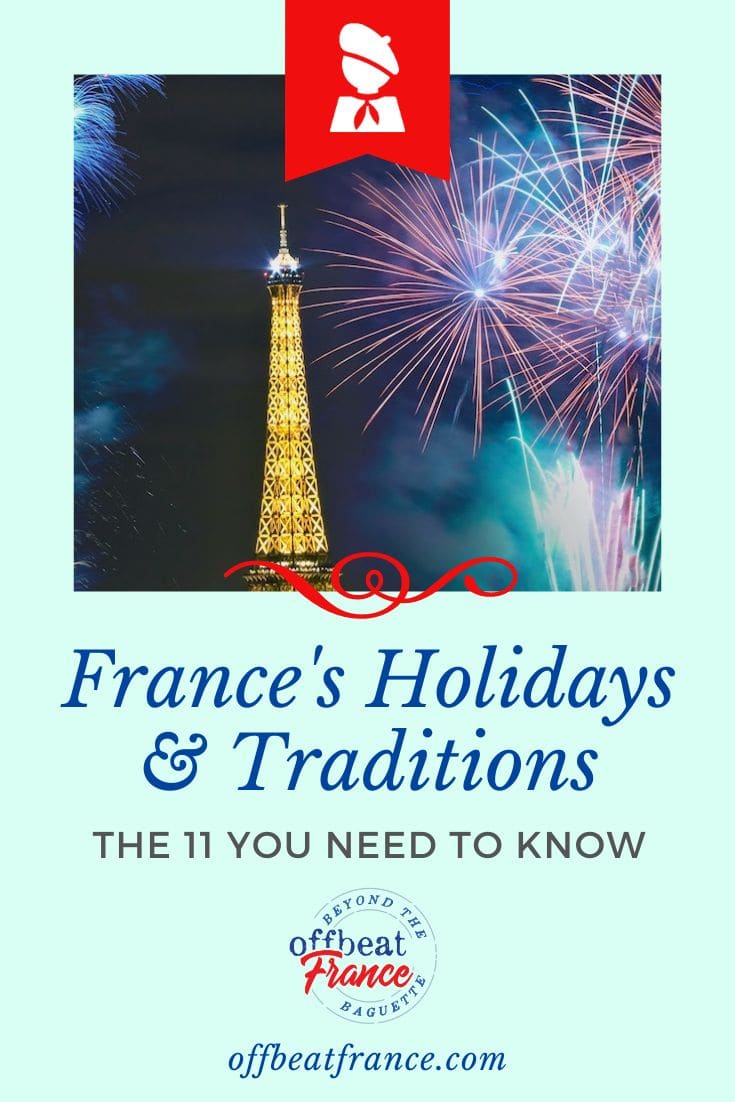Unsure about your French table manners? Click Here to download > > How to avoid these 10 food etiquette mistakes !
11 Essential French Holidays And Traditions You Should Experience
Published 13 September 2022 by Leyla Alyanak — Parisian by birth, Lyonnaise by adoption, historian by passion
Here are the main holidays in France and how we celebrate them. Many French take to the roads on holidays, so this will help you avoid the worst of the traffic jams and overcrowded facilities and attractions.
Some months, one would think France is on a perpetual holiday. Take May: depending on the calendar, you might have as many as three long weekends – it can be a bit much.
Yes, there are plenty of French holidays and traditions and no, we're not on vacation all the time.
We have 11 official holidays, which some countries call bank holidays or statutory holidays. These are when shops close, people stay home with their families, and if your gas bottle runs out you'll be stuck with the village pizza vending machine.
Many of these will seem somewhat familiar, but a major one for Americans is missing: there is no Thanksgiving in France. Here's what you WILL find.
NOTE: Pages on this site may contain affiliate links, which support this site. See full Privacy Policy here.
Holidays and traditions in France – and how we celebrate them
The most important holidays in France are based on religion, changes in nature, or history.
France is a Catholic country so having a majority of holidays based on Catholicism should be no surprise.
A vast majority of French identify as Catholics, but when it comes to practising, it's a different story. Fewer than 5% of us go to church every week, with most people limiting church visits to Easter and Christmas − if that.
Even so, 6 of our 11 official holidays are Catholic.
These holidays, however, are rarely celebrated as religious feasts. They are opportunities to visit family, eat good food, or "faire le pont" − literally "make the bridge", say by taking Friday off when the holiday falls on a Thursday.
When it comes to holiday traditions in France, every opportunity is a good one.
The 11 official public holidays of France
OFFICIAL HOLIDAYS FOR FRANCE**
- 1 January − Nouvel An (New Year's Day)
- Lundi de Pâques (Easter Monday)
- 1 May - La Fête du Travail (May Day)
- 8 May - Fête de la Victoire de 1945 (VE Day)
- L'ascension (40 days after Easter)
- Pentecôte (50 days after Easter)
- 14 July - La Fête Nationale (Bastille Day)
- 15 August - L'assomption (Assumption Day)
- 1 November - La Toussaint (All Saints' Day)
- 11 November - L'armistice (Armistice Day)
- 25 December - Noël (Christmas)
**NOTE: Some regions may have additional holidays. For example, Alsace and Moselle have an extra two holidays, Good Friday and Boxing Day (but without the sales). In Britain, these are called French bank holidays.
1. New Year's Day – Jour de l'an : January 1
No surprise that the first day of the year is a public holiday, if only to recover from the Saint-Sylvestre, or New Year's Eve. One of the common French New Year traditions takes place when the clock strikes midnight, and everyone kisses everyone else − "faire la bise". Champagne is usually involved.
On New Year's Day, the party mood will continue, but at home, usually with a massive meal almost as long as the meal at Christmas. Expect to spend a few days recovering.
2. Easter Monday − Lundi de Pâques
In the Catholic faith, Easter Monday represents the resurrection of Jesus Christ, and the end of Lent. It is this second celebration that tends to be uppermost in our minds, along with French Easter traditions like eggs, the Easter bunny, and guilt-free eating of chocolate.
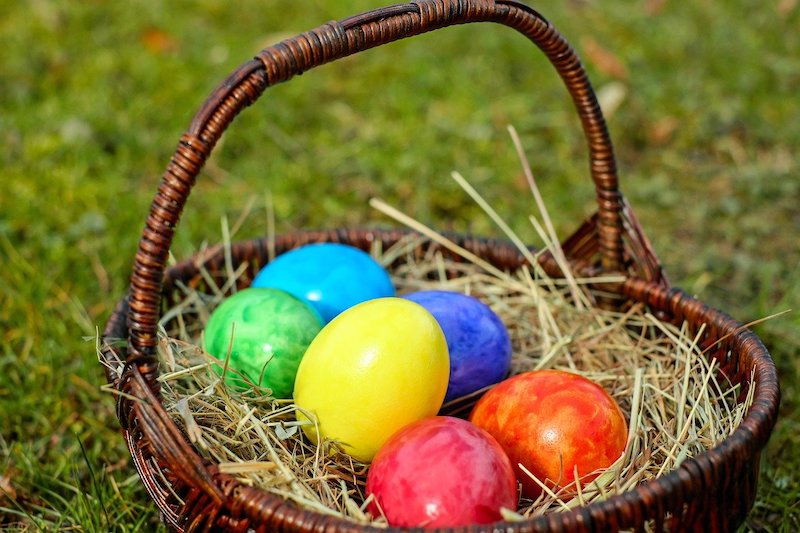
Have you heard of the Easter bell tradition?
In a myth that dates back to the Middle Ages, the bells had to stay silent between Good Friday and Easter Monday. Children were told the bells were away, flying to Rome to be blessed by the Pope. On their way home, they would shower down sweets and presents.
Officially, the bells would fly home on the Saturday, so Sunday would be time for the big Easter egg hunt... real eggs painted bright colours, or better yet, chocolate eggs (or rabbits or owls or all sorts of interesting creations).
The traditional Easter meal, by the way, is roast lamb, although some people might substitute rabbit. Eggs in some shape or form are also served.
3. May Day, or Labor Day − Fête du travail: May 1
You'll be hard-pressed to find anything other than a baguette or a bouquet of flowers on May Day in France because pretty much everything is closed. Medical services are limited to emergencies and public transportation dwindles to a trickle.
This is International Workers' Day and is traditionally filled with marches and demonstrations across France for worker and other rights. If you're ever going to march in France, this may be the day to do it.
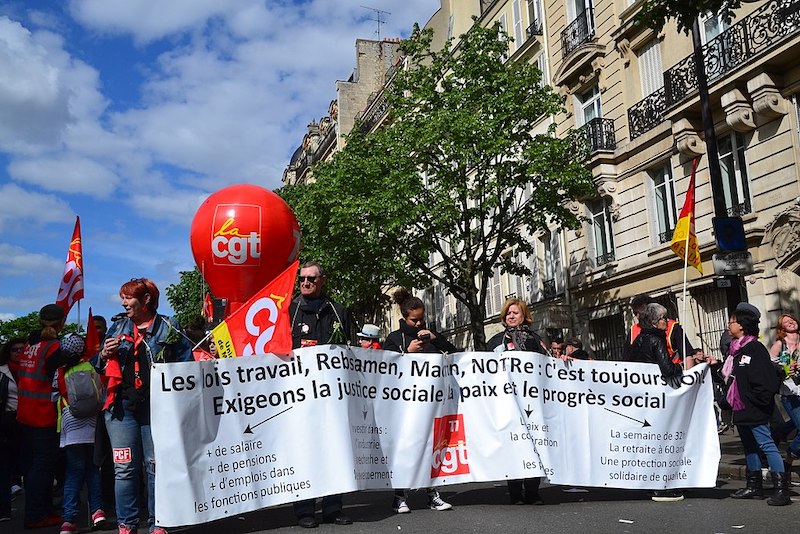 This is what a typical May Day celebration looks like when people take to the streets Jeanne Menjoulet from Paris, France, CC BY 2.0, via Wikimedia Commons
This is what a typical May Day celebration looks like when people take to the streets Jeanne Menjoulet from Paris, France, CC BY 2.0, via Wikimedia CommonsFailing that...
It's also known as the Fête du Muguet, or the Day of the Lily of the Valley, and the flowers are on sale everywhere. Buy a bunch and give it away to your loved ones - for love and luck.
It appears the tradition of giving this flower for good luck dates back to the 16th century, when Charles IX apparently received a bunch for good luck. He was so delighted that he decreed all women at court should receive the same flowers every first of May.
Rooted in Germanic, Celtic or Roman culture, the holiday originally celebrated the passage from the dark season to the season of light. In France we reconnect with these pagan traditions by offering each other some good luck in the form of lily of the valley.
As for the day itself, it was inspired by an 1886 gathering of 200,000 workers in Chicago who called for an eight-hour work day. In France, the first workers' May Day march took place four years later, in 1890.
In some cities, you might run into marchers wearing medieval costumes. They represent a far right political party that uses the date to celebrate the day Joan of Arc freed the city of Orleans from the English. The date was actually 8 May 1429 and the original French celebration took place on 8 May − but was switched for political reasons, to "compete" with the left-wing trade union and worker celebration.
4. VE Day – Fête de la victoire de 1945 : May 8
This day commemorates the unconditional surrender of German forces at the end of World War II and the end of the German occupation of France.
On this day, the French President reviews the troops at the Place de l'Etoile in Paris and revives the flame of the Unknown Soldier at the Arc de Triomphe, where he lays a wreath.
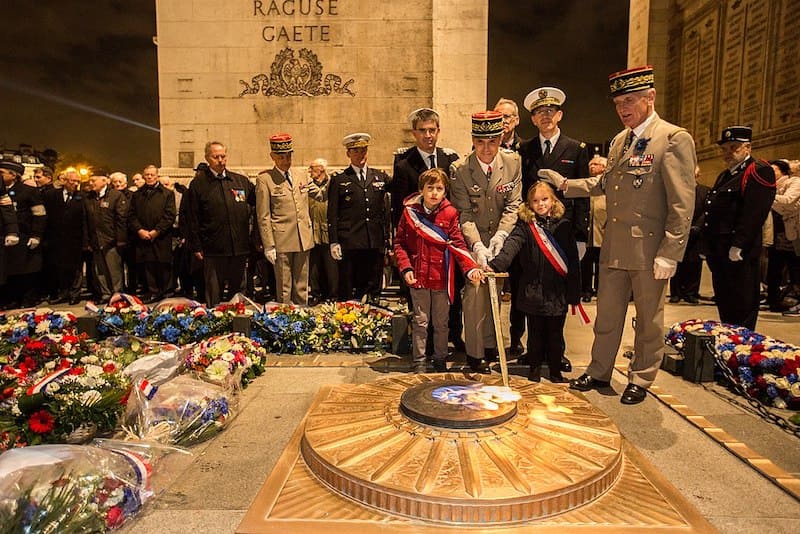 On VE Day in Paris, the flame is rekindled at the Arc de Triomphe in Paris Ecole polytechnique from Paris, CC BY-SA 2.0, via Wikimedia Commons
On VE Day in Paris, the flame is rekindled at the Arc de Triomphe in Paris Ecole polytechnique from Paris, CC BY-SA 2.0, via Wikimedia CommonsBut it hasn't always been a holiday in France.
The holiday was first decreed by law in 1946 − but only if it fell on a Sunday. Otherwise, it would be celebrated the first Sunday after 8 May. Then, 8 May was formalized, cancelled, changed, and reinstated by various governments.
In 1975, to celebrate Franco-German reconciliation, the commemoration of the Allied victory was renamed the Day of Europe until, finally, in 1981, it became an official holiday in memory of the end of World War II and its fighters.
5. Ascension Day – l’Ascension : 40 days after Easter
Some may call it Holy Thursday, and this Christian holiday celebrates the last meeting of Jesus with his disciples before ascending to heaven after 40 days in the desert. The date may be variable, but it always falls on a Thursday.
Catholics go to church, everyone else takes the day off.
6. Whit Monday – Pentecôte : 50 days after Easter
This Christian holiday commemorates the descent of the Holy Spirit. In the wake of the 2003 heat wave, when nearly 20,000 people − mostly elderly − died, a new law made this day a day of solidarity, during which workers would work an eight-hour day for free, the money going to support the less fortunate.
Not all companies do this, however, and they can agree on another day, any day of the year except 1 May. It's all a bit confusing, and many people aren't sure whether a shop or office will be open on that day or not. But it's not a religious holiday anymore.
7. Bastille Day – La fête nationale : July 14
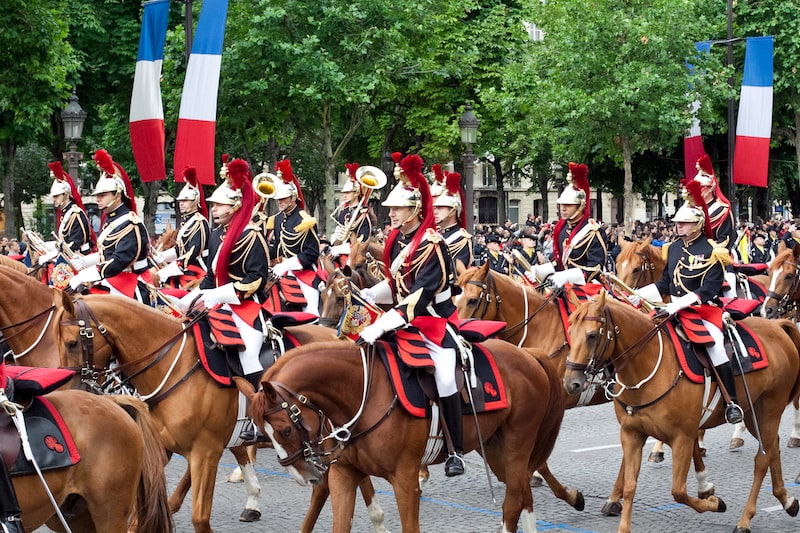 The Bastille Day parade in Paris along the Champs Elysées
The Bastille Day parade in Paris along the Champs ElyséesJuly 14th in France is the national holiday of France and celebrates the storming of the Bastille, a fortress used as a prison, an event which launched the French Revolution. But the truth is a little more nuanced.
In fact, our Fête Nationale celebrates not one, but two 14 Julys, a year apart, one in 1789 and the other in 1790. Here's the full story.
This is probably the best known of French holidays and celebrations: there isn't a village without its festivities so wherever you are in France, this is a time to go out and mingle.
8. Assumption – L’assomption : August 15
This day celebrates a variety of things. In its Catholic version, it celebrates Mary's rise to heaven. But there's a lot more to this story.
Back in 1637, King Louis XIII hoped for a son and called on the country to pray to Mary to grant his wish. The king issued the decree on 15 August, placing the nation under Mary's protection and making it one of the major France national holidays.
But more than a century later, Emperor Napoleon (the ruler the French love to hate) was also born on 15 August, and he would forever resent having to share his birthday with Mary's special day, and because of a royal decree to boot.
So he issued his own decree in 1806, cancelling Assumption Day and replacing it with something glorifying him instead: Saint Napoleon. The Pope complained, of course, but Napoleon ignored him.
Once Napoleon abdicated in 1814, Assumption Day was restored. So much for grandiosity.
In any event, few French celebrate this holiday. It happens in the middle of summer, when many of us are on holiday anyway and it goes unnoticed.
9. All Saints’ Day − La Toussaint : November 1
This is a day to honour the dead, and cemeteries across France will be filled with relatives coming to pay their respects to their loved ones with chrysanthemums, which you'll find on sale everywhere.
It's also pretty much the end of the warmer days and if you're visiting Paris in the fall, you'll notice the temperature has begun to change, as it is in the rest of France in autumn.
10. Armistice Day − L'armistice : November 11
This day commemorates the signing in 1918 of the armistice ending World War I in Versailles. Then, two years later, the coffin of an unknown soldier was buried under the Arc de Triomphe in Paris. And in 1923, Minister of War André Maginot lit a flame of remembrance in honour of all the fallen. Since then, every Armistice Day, a solemn ceremony has rekindled the official flame, even during the years of German occupation.
Not everything is closed on 11 November and this is one of those France celebrations and holidays on which employers can ask you to work. Large shops and malls are open, but if you live in a small town or a village, as I do, chances are most things will be closed for the day.
11. Christmas − Noël : December 25
Christmas is a wonderful time to visit France and Paris in winter is especially lovely – a quick glance at the illuminations along the Champs-Elysées will confirm that. It's also the season when Christmas markets appear across the country, with all their local fare and hand-crafted goods, along with plenty of other French Christmas traditions.
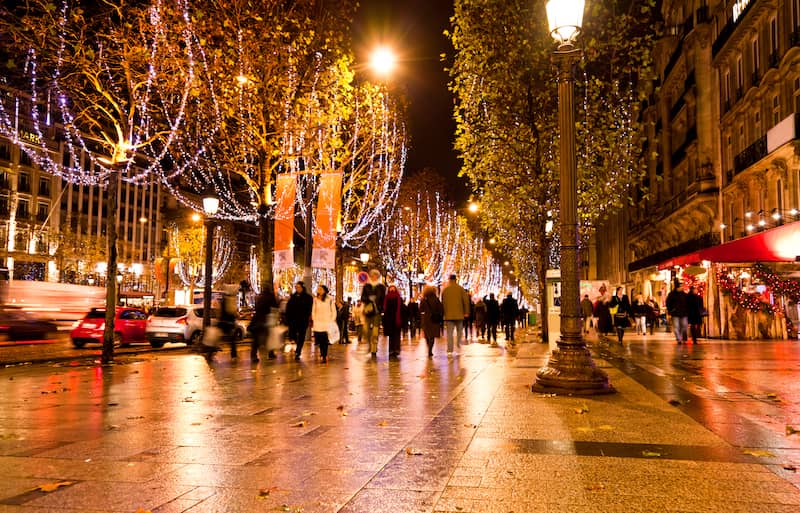
Most places will decorate their church and a few of the main streets, and in recent years, more and more houses are putting up decorations. That said, energy shortages may soon make this less popular. Many of the more religious homes will have a nativity scene of sorts, and a Christmas tree is a must.
This is also time for a special Christmas meal, with the finest foods of the year. The meal might take place on the evening of 24 December or at lunch on the 25th − it depends on the family. I celebrate on Christmas Day.
Either way, the event is usually a lengthy one, with several courses of wonderful food – oysters, smoked salmon, foie gras, escargots and plenty more. Dessert will usually be a bûche, or a log. Head to the patisserie and order yours: just tell them how many people it's for, and they will provide the appropriate length. These days they come in a variety of flavours, vanilla of course but also chocolate, coffee, and strawberry, among others.
Santa Claus visits, of course, the evidence being found under the tree on Christmas morning. This day is one of those celebrations around the world which go beyond faith and are enjoyed everywhere.
Other famous French traditional celebrations
Epiphany – Épiphanie or Fête des rois : January 6
This was once officially on 6 January but the Vatican decreed during the 1960s that it would be celebrated the first Sunday of the year. This is when, in Christianity, the three wise men, or Magi, visited Jesus soon after his birth. That said, plenty of traditionalists celebrate it on the 6th, whatever day it falls on.
In France we have a tradition of the Galette des Rois, the kings' cake, which is made of flaky dough stuffed with almond cream. It has another peculiarity − a hard bean (a fève) or other small object will be hidden inside, and the person who ends up with the item will be king or queen for a day. This involves wearing a golden paper or cardboard crown, which is usually included with the galette.
There is a tradition whereby the youngest child will hide under the table and call the names of those receiving a slice of cake, just to keep things fair, of course.
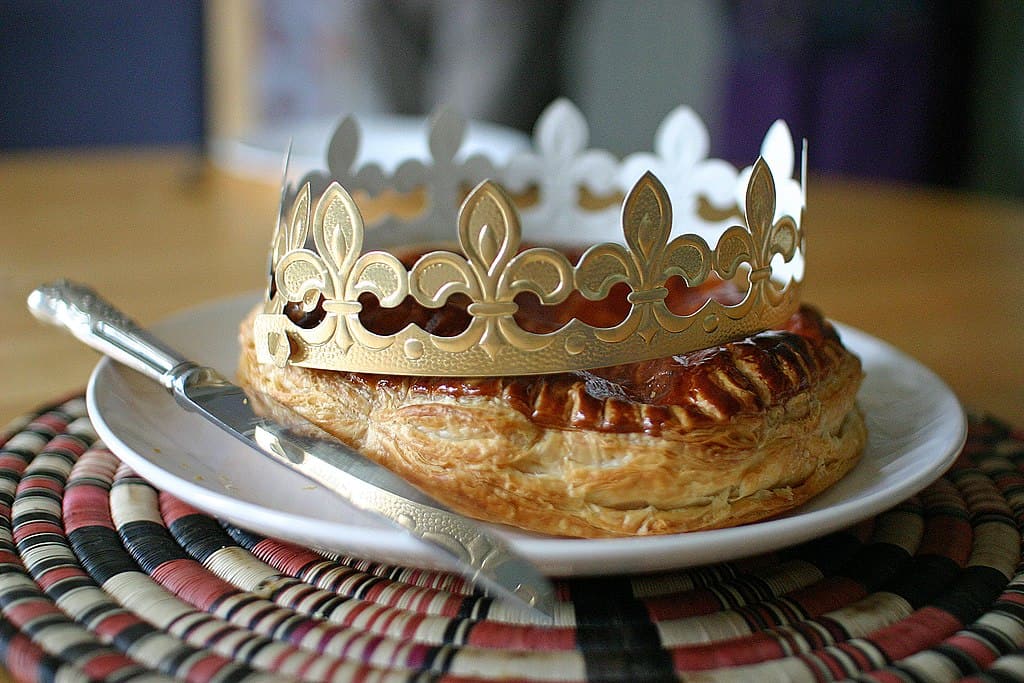 The Galette des Rois, made to measure Steph Gray, CC BY-SA 2.0, via Wikimedia Commons
The Galette des Rois, made to measure Steph Gray, CC BY-SA 2.0, via Wikimedia CommonsIt would seem as though the tradition of the galette dates back to Roman times, during the Saturnalia (the week-long Roman feast held in honour of Saturn). Owners and slaves would share a meal and the slave finding the fève − a gold coin − would be king for a day.
The tradition was adopted by Christians during the Middle Ages to celebrate the Epiphany.
Candlemas – Chandeleur : February 2
 Crêpes, the traditional Candlemas meal
Crêpes, the traditional Candlemas mealThis Christian holiday takes place 40 days after Christmas and celebrates the purification of Mary after childbirth and the presentation of Christ in the Temple.
For many people, though, it is better known as Pancake Day, or "Jour des Crêpes", and of course there are traditions (or superstitions) attached to it. Here's one: hold a coin in your writing hand and your crêpe pan in the other, and flip the crêpe; if it falls back into the pan, you'll have a great year.
Candles were traditionally blessed at this festival.
Valentine’s Day – Saint-Valentin : February 14
This is one of those holidays which is gaining ground although Valentine's Day in France isn't celebrated in any specific way. We do give our loved ones flowers or chocolate, but we don't exchange cards with friends and acquaintances.
There is some resistance to the holiday, however, which many French see as overly commercial and a bit of a marketing opportunity designed to part you from your money. Still, French Valentines Day traditions are on the rise.
Mardi Gras : March-April
It may have started as a pagan tradition celebrating the end of winter, but like many of these French traditions it was absorbed into Christianity. It also happens to be the last chance to indulge yourself before the ritual fasting of Lent.
The celebration is known for its masked balls, which made their first appearance in the 13th century. This anonymity allowed guests to adopt a new persona for the night and leave their reality behind, whether social class or family ties. Over time, the disguises came to symbolize a certain level of freedom.
Head for one of the more colourful and famous French carnivals − Nice, Paris, Dunkirk, Annecy, Mulhouse...
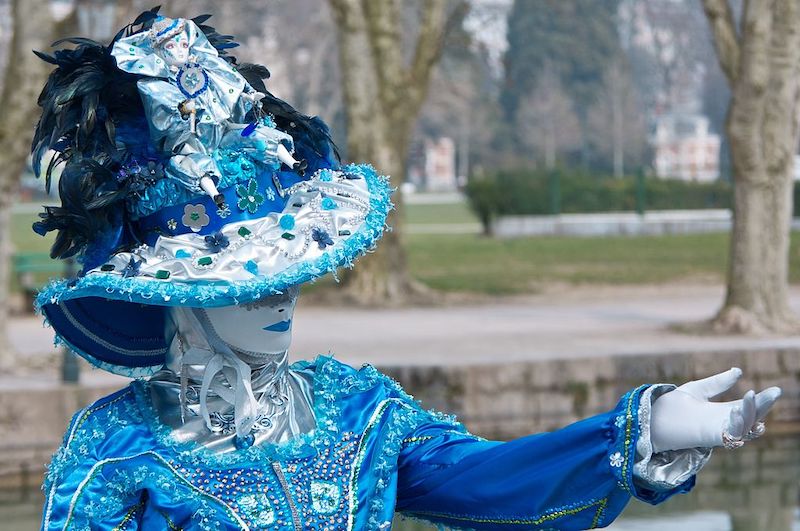 A costume typical of the Annecy Carnival by papafranco2012, CC BY 2.0, via Wikimedia Commons
A costume typical of the Annecy Carnival by papafranco2012, CC BY 2.0, via Wikimedia CommonsApril Fool’s day – Poisson d’Avril : April 1
In French it translates as "April's fish", a term that has many stories of origin. As children, in its simplest form, we April fools would cut out a fish from coloured paper and stick it surreptitiously on someone's back, laughing when they realized what was stuck on them as we shouted "Poisson d'Avril"!
In one version, the name comes from the start of the fishing season, but with such few fish this early in the season, this turned into a prank: if someone managed to convince you they had caught a fish, you were the fool. In another version, "poisson" is a corrupted version of the word "passion", which refers to the Easter season. And there are many more stories.
Additional French celebrations in France today
- The Saturday closest to 18 May: Night of the Museums, during which they are open late into the night and stage a huge variety of events
- Last Friday in May: Fête des Voisins, Neighbour's Day, celebrated in many parts of France to bring neighbours closer together − it often involves neighbourhood parties or bringing food for collective meals
- Last Sunday in May: Mother's Day
- 20 June: Father's Day
- 21 June: Fête de la Musique for the summer solstice, with music happening all over France, from official venues to bar bands and dancing in the streets
- 3rd Sunday in September: Journées du Patrimoine, or European Heritage Days, is one of the major French cultural events, when historic buildings you never enter otherwise are open, like the Elysée Palace, where France's President works
- Sometime between the end of September and October: the désalpe, a local Alpine tradition that involves bringing the cows down from their mountain pastures (bells, flowers and lots of cows)
- 31 October: French Hallowe'en traditions are relatively new − Trick or Treat is not an established custom, and the holiday spirit is more one of supermarket alleys filled with disguises
- 3rd Thursday of November at midnight: Beaujolais Nouveau is released
- December: Christmas markets all over France
- January and July: the official sales, which last about four weeks.
French holiday season and school holidays
Most French people − who usually have six weeks off a year − go on holidays at specific times. August is popular, which is why it's not the best time to visit France, since many places are closed (unless you're headed for the beach, that is).
France has several sets of school holidays and it's important to know when they are before you decide to come to France. There are three zones: A, B and C, with each taking holidays at a slightly different time. They change slightly every year and you can find them here.
All in all, schools have five sets of holidays, and you should become aware of these before you book your France holidays:
- Autumn holidays, or the "vacances de la Toussaint", which last two weeks in October-November
- Christmas holidays, two weeks
- Winter holidays, or "vacances d'hiver", two weeks in February-March
- Spring holidays for two weeks in April-May
- and finally, summer holidays, for 7-8 weeks
French traditions and holidays by month
Since you may be planning your trip to France at a precise time of year, here's a list of popular French holidays by month to help you get organized.
French holidays in January
Christmas holidays spill into January, with the Epiphany on 6 January signalling the "official" end of the holidays. However, plenty of people take holidays in January, unless they have children due back in school. This is when the cultural season, interrupted by Christmas, slowly gears up again.
Paris in winter can be quite active, with plenty to do, and January is also the traditional month for winter sales.
French holidays in February
Most of France is on school holidays at some point in February, and sometimes into early March. There are three vacation zones, and they stagger their holidays throughout the month. Check each year's exact dates because travel during the school holidays can be difficult, with many places full and more visitors than you might like at attractions. This is also when La Chandeleur, or Candlemas, is celebrated, along with Valentine's Day.
French holidays in March
Easter falls in either March or April, so check the date. The week before and after Easter can be quite slow in France, as people try to take advantage of the long Easter weekend to take extra days off.
This is also a month of carnivals across France. Here's a very complete list, but it's in French. Still, it will give you an idea of just how much is happening in March, including major Mardi Gras celebrations.
French holidays in April
When Easter doesn't start in March, it takes place in April. And this is also the month children enjoy their spring school break – another two weeks off so again, check out these rotating dates so you'll know when popular children's attractions are likely to be more crowded.
French holidays in May
May is France's holiday month par excellence. A bit like August, very little gets done because there are three main holidays in May in France, and sometimes four: Labor Day, VE Day, Ascension Day, and sometimes, depending on when Easter falls, Whit Monday might be celebrated this month as well.
If any of these holidays fall in mid-week, expect everyone who can take a long weekend to do so. As a result, some people will end up with most of the month off.
French holidays in June
While Whit Monday may fall in June, there are no other official holidays this month, but plenty to do. These include such France celebrations as the annual Fête de la Musique, or Music Festival. There are plenty of tourists in June, the weather is usually divine, and children are still in school
French holidays in July
The first week of July is when school usually ends for the summer holiday. This is a celebratory time of year, with Bastille Day right in the middle of the month, and the Tour de France taking place in different mountainous parts of the country.
French holidaymakers are divided between July and August and a good half of the population takes its summer vacation this month.
French holidays in August
Along with July, this is my least favorite month: the other half of France goes on holiday, and the cities shut down. If you've ever been to Paris in August (or any other city in France), you'll know what I mean.
Assumption Day is in the middle of August but you'll hardly notice it – while many places are closed, plenty of people are already on vacation.
French holidays in September
September is a wonderful month, filled with energy and cooler temperatures (the droughts of recent years are making summers in France quite difficult). This is when schools reopen, and when the cultural season kicks off with the Journées du Patrimoine, or the European Heritage Days. These are not to be missed if you're in France – this is the weekend when special venues which are often closed to the public allow you to visit and explore what's happening behind the scenes.
There are also major culinary events this month, so keep an eye out for those.
French holidays in October
It's time for the autumn school holidays, but such a lovely month in France that it is many people's favorite. The school holidays may stretch into November as well. There are no official holidays this month... Hallowe'en seems to ebb and flow – some years the displays are major and children come out in droves to trick or treat, while other years, you would hardly know.
French holidays in November
There are two official holidays in November, All Saints Day and Armistice Day, but it's also wine time, when Beaujolais Nouveau makes its appearance and the world's largest charity wine auction takes place in Beaune.
French holidays in December
December leads into the holiday season, with Christmas markets popping up everywhere and households brushing up on the cooking for Christmas meal traditions. This is the month of Christmas Eve and Christmas, but the holidaying starts a week or two before. If you need to get something official done, you may well have to wait until mid-January before anyone feels your case requires any urgency.
➽ Still not sure when to come and see us? Here are the best times to visit France.
FAQ: French holidays and traditions
How do you say celebrations in French?
Célébrations. Pronounced say-lay-brah-see-OH.
How do you say holidays in French?
Vacances (similar to vacation). Pronounced vaw-CONS.
What is the most important holiday in France?
It's a toss-up between Christmas and Bastille Day: each speaks to a different part of us.
What are 3 major holidays in France?
Christmas, Bastille Day and Easter.
What are the 11 French holidays?
- 1 January - Nouvel An (New Year's Day)
- Lundi de Pâques (Easter Monday)
- 1 May - La Fête du Travail (May Day)
- 8 May - Fête de la Victoire de 1945 (VE Day)
- L'ascension (40 days after Easter)
- Pentecôte (50 days after Easter)
- 14 July - La Fête Nationale (Bastille Day)
- 15 August - L'assomption (Assumption Day)
- 1 November - La Toussaint (All Saints' Day)
- 11 November - L'armistice (Armistice Day)
- 25 December - Noël (Christmas)
What traditions are celebrated in France?
Most French holidays and traditions are Christian in origin, although many of them have pagan elements.

